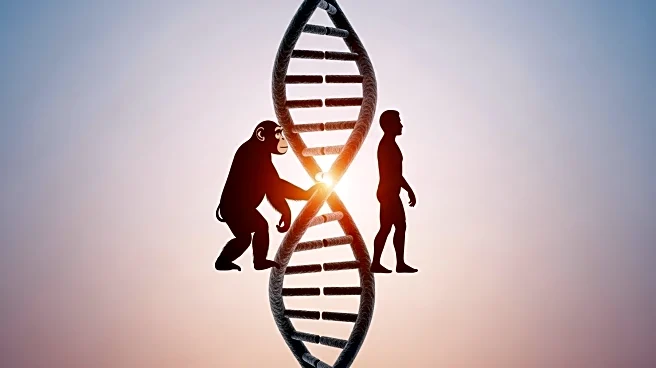What is the story about?
What's Happening?
Recent discussions have revisited the claim that humans and chimpanzees share nearly 99% of their DNA. This figure, often cited in scientific literature, is being scrutinized for its accuracy and implications. Experts from institutions such as the UC Santa Cruz Genomics Institute and the University of California, San Francisco, have highlighted that while early research suggested a high degree of similarity, this figure does not account for significant differences in noncoding DNA. These noncoding regions, which do not directly code for proteins, play crucial roles in gene regulation and expression. The actual genetic difference, when considering these regions, may be closer to 5% to 10%. This discrepancy arises from the difficulty in aligning certain genomic regions between the two species, which can lead to underestimations of genetic divergence.
Why It's Important?
Understanding the genetic similarities and differences between humans and chimpanzees is vital for evolutionary biology and medical research. The insights into noncoding DNA and its regulatory functions can inform studies on genetic diseases and developmental biology. The realization that noncoding regions significantly contribute to genetic differences underscores the complexity of genetic expression and its impact on phenotypic traits. This knowledge can influence how scientists approach genetic research, potentially leading to breakthroughs in understanding human evolution and developing medical treatments. The broader implications extend to ethical considerations in genetic research and the conservation of species closely related to humans.
What's Next?
Future research is likely to focus on further mapping and understanding the noncoding regions of the genome. Advances in genomic technology may allow for more precise comparisons and a deeper understanding of the functional implications of genetic differences. This could lead to new methodologies in genetic engineering and personalized medicine, where treatments are tailored based on an individual's unique genetic makeup. Additionally, the findings may prompt discussions on the ethical dimensions of genetic manipulation and conservation efforts for primates.
Beyond the Headlines
The exploration of noncoding DNA highlights the intricate nature of genetic regulation and its evolutionary significance. As scientists delve deeper into these regions, there may be revelations about the genetic basis of complex traits and behaviors. This could challenge existing paradigms in genetics and evolutionary theory, prompting a reevaluation of how genetic information is interpreted and applied in various fields.

















